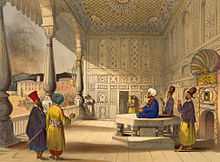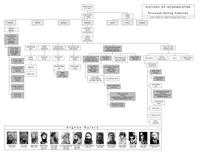Alakozai
 | ||||||||||||||||||||||||||||||||||||||||||
| History of Afghanistan | ||||||||||||||||||||||||||||||||||||||||||
|---|---|---|---|---|---|---|---|---|---|---|---|---|---|---|---|---|---|---|---|---|---|---|---|---|---|---|---|---|---|---|---|---|---|---|---|---|---|---|---|---|---|---|
| Timeline | ||||||||||||||||||||||||||||||||||||||||||
|
Ancient
|
||||||||||||||||||||||||||||||||||||||||||
|
Medieval
|
||||||||||||||||||||||||||||||||||||||||||
|
Modern
|
||||||||||||||||||||||||||||||||||||||||||
| ||||||||||||||||||||||||||||||||||||||||||
Alakozai (Pashto: الکوزی - meaning descendant of Alako in Pashto) is the name of a Pashtun tribe in Afghanistan. Spelling variations include Alakozay, Alekozai, Alekuzei, Alikozai, Alokozay, Alakoozi, Alkozai, Alokzai, Halakozai, Alecozay, Alikusi,and Alakuzei.
History


The Alakozai are a sub-tribe of the Abdali Pashtuns of Afghanistan.[2] They are one of four sub-tribes belonging to the Zirak branch of the Durrani - Tareen - Bor Tareen - Abdali dynasty.[3][4] Their eponymous ancestor is supposed to be Alako, son of King Zirak Khan, son of Abdali, son of Tareen,[5][6] son of Sharif ud-din (Sharakh-bun), son of Ibrahim Sari (Saraband), son of Qais ul-Laik ('Abdu'r Rashid Pathan).,[5] he was the arisch chief of Ghor, and converted to Islam by the Islamic prophet Muhammad.[5] It is said that Alako was buried at Nicharah, a valley in the Harboi mountains to the east of Kalt in Baluchistan.[7]
Distribution
The Alakozai are found primarily in Helmand, Kandahar, Kabul, Laghman, Kunar Sarkani District and Herat provinces in Afghanistan, and form the majority of the population in the Sangin District. Jaldak, which is located 110 km northeast of Kandahar, is the original domicile of the Alakozai tribe.[8] The Alakozai people stretch from Farah to Kandahar, and constitute a majority in the Arghandab District of Kandahar. [9] The Arghandab district was given to the Alakozai tribe by King Nadir Shah, who brought down the Safavid empire of Persia with the help of the Alakozai in 1738.[10] Arghandab was referred to by the Greek historians as Arakozia, or the "Land of Arako/Aloko".[11][12] Alexander the Great faced a fierce resistance from the forefathers of the Alokozai's in Arghandab. Arghandab is also mentioned as Saraswati in Rigveda, and Harwati in Avesta.[12]
Notable individuals
- Queen Zarghoona Alakozai (mother of King Ahmad Shah Durrani, founder of the Durrani Empire).[13][14]
- Abdul Ghani Alakozai, governor of Nadirabad[15] and chieftain of the Durrani,[16] under King Nader Shah.
- Juma Khan Alakozai, governor of Kashmir (1788–1792). His administration was faced by serious floods, Shia - Sunni riots and rioting by the Bambas. He died of dysentery in 1792.[17]
- Abdullah Khan Alakozai, governor of Kashmir (1795–1807, under King Zaman Shah Durrani).[17][18][19][20]
- Shah Aghasi Nawab Khan Alakozai, governor of Kashmir (18..–1840)
- Yar Mahomed Khan Alakuzei (circa 1842) Minister under King Shahzada Kamran Durrani.[21] Minister-regent at Herat, he served as Vizier of Herat from 1829 to 1842, and was the son of Painda Khan.[22]
- Mohammad Khan Azimi(1851–1855), son of Yar Muhammad Khan and minister-regent at Herat. Herat was occupied by Iran from 1852 to 1853.[22]
- 'Abd al-Ghani Khan Alikozai (maternal uncle of King Ahmad Shah Durrani), governor of Kandahar during Ahmad Shah Durrani's reign.[23]
- Zarghuna Begum Alakozai, wife of Governor Sardar Muhammad Zaman Khan of Jalalabad (1839 to 1842),[24] and daughter of Khalu Khan Alakozai.
- Queen Alakozai, stepmother of King Dost Mohammad Khan of Afghanistan,[25] and wife of Sardār Pāyenda Khan, chief of the Barakzai clan.
- Mullah Naqib (c.1950 - October 11, 2007), famous freedom fighter during the Soviet war in Afghanistan, politician and peace maker from Kandahar. He was one of the most respected elders of the Alakozai Pashtun tribe in the Kandahar area.[10][26]
- Salim Khan, Bollywood actor and screenwriter.[27][28][29]
- Salman Khan, very famous Bollywood actor and international star.
Coins

- Yar Muhammad Khan Alecozay (Herat, Mar 1842 - 01 Jun 1851, AH1260):
- Muhammad Yusuf Khan Alakuzei (Herat, 1851–1856):
- AR ½ rupee ND, A-3156, KM-A406, crude vf-ef[22]
- Sayyed Mohammad Khan Alakuzei (Herat, 01 Jun 1851 - 15 Sep 1855):
- ??? [22]
Trivia
For other usage of Alekozai view:
- Alokozay-Group of Companies
- Alokozay-Tea (YouTube channel, Alokozay-Tea UK, Alokozay-Tea Afghanistan)
- Alokozay-Foundation Dubai U.A.E.
- Alekozai Afghan Calendar Project
See also
- Mohammadzai
- Barakzai
- Popalzai
- Achakzai
- Sarbans
- Tareen
- Pathan
- Pashtun tribes
References
- ↑ Mūsá K̲h̲ān Jalālzaʾī: The politics of religion and violence in Afghanistan, S. 24 f.Online
- ↑ The Kingdom of Afghanistan: a historical sketch; by G.P Tate; Published by Asian Educational Services, 2001; ISBN 81-206-1586-7, ISBN 978-81-206-1586-1; p. 18
- ↑ E.J. Brill's First Encyclopaedia of Islam, 1913-1936; M. Th. Houtsma, T. W Arnold, A. J. Wensinck; Published by BRILL, 1993; p. 1083
- ↑ International Encyclopaedia of Islamic Dynasties; by Nagendra Kumar Singh; Published by Anmol Publications PVT. LTD., 2000; ISBN 81-261-0403-1, ISBN 978-81-261-0403-1
- ↑ 5.0 5.1 5.2 Afghanistan, The Durrani Dynasty Genealogy (page 1)
- ↑ State and tribe in nineteenth-century Afghanistan: the reign of Amir Dost Muhammad Khan (1826-1863); by Christine Noelle, Christine Noelle-Karimi; Published by Routledge, 1997; ISBN 0-7007-0629-1, ISBN 978-0-7007-0629-7; p. 384-385
- ↑ The Kingdom of Afghanistan; George Passman Tate; Asian Educational Services, 2001; ISBN 81-206-1586-7, ISBN 978-81-206-1586-1; p. 19
- ↑ The Hidden treasure: a biography of Pahtoon poets; by Muḥammad Hōtak, ʻAbd al-Ḥayy Ḥabībī, Abdul Hay Habibi, Khushal Habibi; Translated by Khushal Habibi; Published by Rowman & Littlefield, 1997; ISBN 0-7618-0265-7, ISBN 978-0-7618-0265-5; p. 193
- ↑ People of Ghazni, Program for Culture & Conflict Studies
- ↑ 10.0 10.1 Chayes, Sarah (2007-11-18). "A Mullah Dies, and War Comes Knocking". The Washington Post. Retrieved on 2008-07-20.
- ↑ Afghanistan, Volumes 25-26 By Anjuman-i Tārīkh-i Afghānistān
- ↑ 12.0 12.1 The Khyber Gateway Alakozai
- ↑ Introduction about Ahmad Shah Baba's Life
- ↑ Afghanistan, The Durrani Dynasty Genealogy (page 4)
- ↑ The Kingdom of Afghanistan; George Passman Tate; Asian Educational Services, 2001; ISBN 81-206-1586-7, ISBN 978-81-206-1586-1; p. 64
- ↑ The Kingdom of Afghanistan; George Passman Tate; Asian Educational Services, 2001; ISBN 81-206-1586-7, ISBN 978-81-206-1586-1; p. 58
- ↑ 17.0 17.1 Kashmir: A Wailing Valley; M. L. Gupta; Anmol Publications PVT. LTD., 2001; ISBN 81-261-0951-3, ISBN 978-81-261-0951-7; p. 65
- ↑ The Kingdom of Afghanistan: a historical sketch; by G.P Tate; Published by Asian Educational Services, 2001; ISBN 81-206-1586-7, ISBN 978-81-206-1586-1; p. 106
- ↑ International Encyclopedia of Islamic Dynasties, Vol. 2 Afghanistan; Nagendra Kr. Singh; Anmol Publications PVT. LTD., 2000; ISBN 81-261-0403-1, ISBN 978-81-261-0403-1; p. 339
- ↑ Catalogue of Coins in the Panjab Museum, Lahore; Lahore Museum; Richard Bertram Whitehead; 1934, p. 29
- ↑ Dictionary of Indian Biography; by Charles Edward Buckland; Published by S. Sonnenschein, 1906; p. 228
- ↑ 22.0 22.1 22.2 22.3 22.4 22.5 Chiefa Coins Afghanistan
- ↑ State and Tribe in Nineteenth-Century Afghanistan: The Reign of Amir Dost Muhammad Khan (1826-1863): The Reign of Amir Dost Muhammad Khan (1826-63) (page 4)
- ↑ Afghanistan, The Durrani Dynasty Genealogy
- ↑ Life of the amir Dost Mohammed Khan of Kabul: with his political proceedings towards the English, Russian and Persian governments, including the victory and disasters of the British army in Afghanistan. By Mohan Lal, 1846; p. 22
- ↑ "Mullah Naqib - Losing an Ally". CBC.ca. 2007-10-15. Retrieved on 2008-07-03.
- ↑ Mitra, Devirupa (17 May 2011). "Khans in Bollywood: Afghan traces their Pathan roots". IANS. Retrieved 2014-07-17.
- ↑ "Khans in Bollywood: Afghan traces their Pathan roots". Deccan Herald. 17 May 2011. Retrieved 2014-07-17.
- ↑ Swarup, Shubhangi (29 January 2011). "The Kingdom of Khan". OPEN. Retrieved 2014-07-17.
Salim Khan, scriptwriter and father of Salman Khan, remembers the Afghan tribe his family historically belongs to. “It is Alakozai,” he says. “My family came to Indore 150 years ago, and worked as [part of the] cavalry in the time of the British.” Salman Khan is a fifth-generation Khan in India. While completing his MA in Indore, young Salim Khan was spotted by some producers who had come to attend a wedding in Tarachand Barjatya’s family. He then left for Bombay, where he acted in what he calls “indifferent roles” in 20-odd films before switching to scriptwriting.
- ↑ Steve Album Rare Coins; List 243: April 2009; Item No. 74628
External links
- Alikozai Tribal Dynamics from the Tribal Analysis Center
- The Khyber Gateway Alakozai
